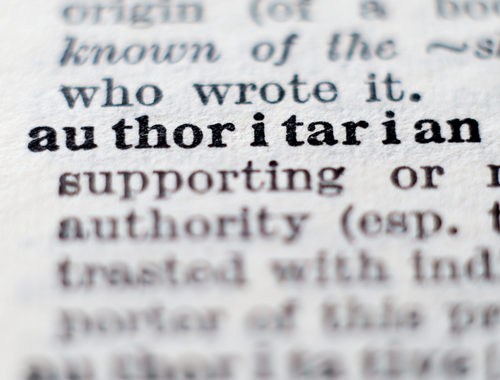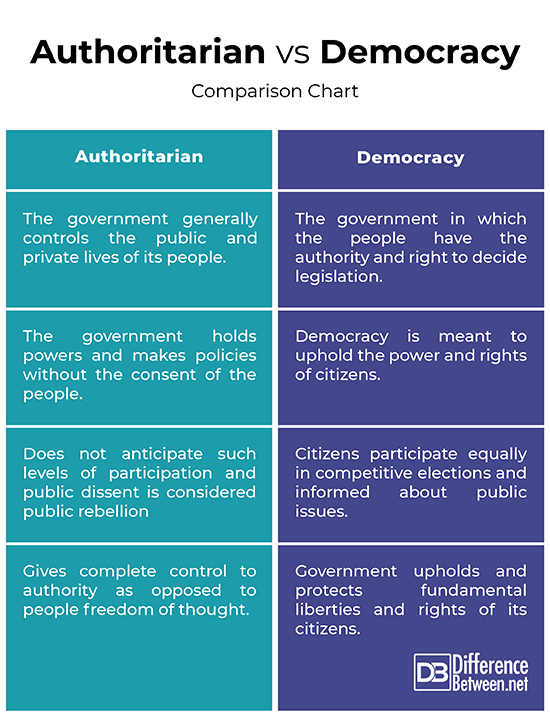Difference Between Authoritarian and Democracy
Democracies around the world are facing serious challenges, with the rise of populist movements and leaders across the globe producing unexpected challenges to human rights and freedom. To better safeguard democracy, we have to understand the foundations of the surge in authoritarian leadership – we needs answers to fundamental questions like why authoritarian leaders gain support and how democracy becomes authoritarian. Above all, we need to understand what an authoritarian government is and how different it is from democracy.

What is Authoritarianism?
It is not unfair to say that for the past couple of years, democracies around the world are being challenged in a way that has never been before. Although the democracies in the world remain at historic highs, there are forces that threaten to reverse the progress of democracy. In places like Myanmar and Sudan, we’ve seen militaries push out civilian-led governments and they are struggling to keep the democracy intact. In 2021, Ecuador and Ethiopia imposed states of emergencies on their populaces. This is not democracy, then what it is? And why is this happening?
There are no easy answers to any of this. Authoritarianism is the opposite of democracy, like dictatorship but not exactly where one person alone holds the power. It is the gradual erosion of democratic rules. Leaders have greater control over the population, restricting their freedoms and enforcing policies without the consent of people. The government generally controls the public and private lives of its people and can make public policies with no regard for their civil liberties. In authoritarianism, the government is controlled by a single person or a small group of elites that exercise unlimited power over those they rule.

What is Democracy?
All political systems can be classified as either authoritarian/dictatorship or democratic. Democracy is a familiar concept. Nations like India, United States, and Germany are quite clearly democratic. The word democracy stems from the Greek words ‘demos’ meaning people and ‘kratia’ meaning rule. Simply put, democracy is a system of government in which the people have the authority and right to decide legislation. Democracy is giving people a central role in governance – a view that stands in contrast to monarchy or authoritarianism. But beyond giving control to citizens, definitions of democracy have evolved over time.
Difference between Authoritarian and Democracy
Governance
– One of the most basic yet fundamental differences between the two government systems is of course governance. Democracy is meant to uphold the power and rights of citizens, so people have the authority and right to decide legislation, and choose their leaders through fair and honest elections. Authoritarianism, on the contrary, is a form of government that holds powers and makes policies without the consent of the people it rules. Freedom, control, free will, elections, such terms is rendered futile in an authoritarian state.
Participation
– Yet another feature that differentiates a democratic government from authoritarianism is the level of civic participation that is expected and allowed. Democracy is where the citizens participate equally in competitive elections and are informed about public issues. Democracy can be defined in terms of the freedoms and liberties that citizens enjoy. Authoritarianism, on the other hand, does not anticipate such levels of participation and public dissent is considered public rebellion. The leader or leaders are the decision makers and they do not allow its citizens to communicate publicly.
Liberties
– Fundamental liberties is what sets a democratic government apart from authoritarian states. In democracy, cultural, ethnic, religious, and other minority groups are afforded equal opportunities to express their interests in the political process. Government upholds and protects fundamental liberties and rights of its citizens to the best of their interests. Authoritarianism, on the contrary, gives complete control to authority as opposed to people freedom of thought and action. The basic rights and freedoms of citizens are not respected; the leader turns a blind eye to the fundamental rights of its citizens or even violates them. Civil liberties such as freedom of religion do not apply to authoritarian states.
Authoritarian vs. Democracy: Comparison Chart

Summary
In a nutshell, democracy is meant to uphold the power and rights of citizens, so people have the authority and right to decide legislation, and choose their leaders. The rule of law is one of the most fundamental attributes of democracy because it serves as the basis for individual rights and liberties. Citizens can use their formal rights to influence the political decision-making process through voting, protesting, lobbying, and so on. On the contrary, attributes such as liberty, freedom, rights, equality, and free will do not apply to authoritarianism. In authoritarianism, the government is controlled by a single person or a small group of elites that exercise unlimited power over those they rule.
How is democracy different from authoritarianism?
Democracy is when everyone’s formal rights of participation are upheld and people have access to free and impartial information, and can enjoy personal liberty, security and privacy. Such fundamentals do not apply to an authoritarian government.
Can authoritarian rule be democratic?
Authoritarian rule is a form of democracy, so it is possible that some democracies would employ authoritarian elements. Authoritarianism is not exactly the opposite of democracy; maybe it’s the pole at the opposite end of a scale.
What are the main differences between authoritarian governments and democratic governments’ quizlet?
Government that controls all aspects of its citizens’ personal, social, and political lives can be referred to as authoritarian. Democracy, on the other hand, is a people-centric political system where freedom is allowed as much as possible to every citizen.
What is the main difference between a constitutional and an authoritarian government?
Authoritarian government is a form of government where the leader has unlimited power and complete control over its citizens. Judicial independence comes under attack from a single leader or a group of leaders seeking to expand their power. The constitutional government acts under the rule of law and is defined by the existence of a constitution.
- Difference Between Caucus and Primary - June 18, 2024
- Difference Between PPO and POS - May 30, 2024
- Difference Between RFID and NFC - May 28, 2024
Search DifferenceBetween.net :
Leave a Response
References :
[0]Svolik, Milan W. The Politics of Authoritarian Rule. Cambridge, United Kingdom: Cambridge University Press, 2012. Print
[1]Diamond, Larry, et al. Authoritarianism Goes Global: The Challenge to Democracy. Maryland, United States: JHU Press, 2016. Print
[2]Lindstaedt, Natasha and Erica Frantz. Democracies and Authoritarian Regimes. Oxford, United Kingdom: Oxford University Press, 2019. Print
